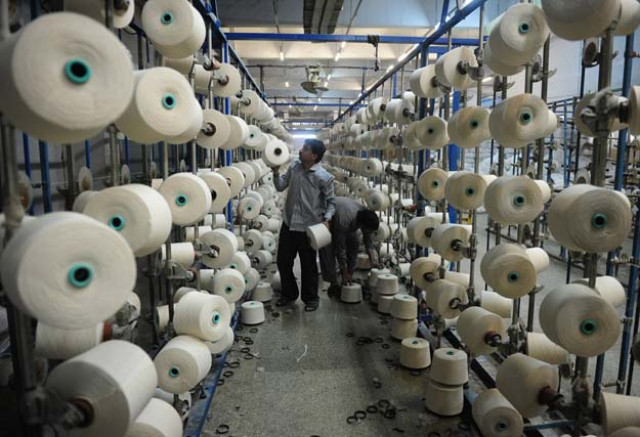Third quarter 2014-15: Visible improvement in economic environment, says SBP
Foreign exchange reserves doubled; reduction in inflation broad-based, says central bank.

Narrowing: 3.8% is the budget deficit during the Jul-March period, compared to 3.9% in the same period of last year. PHOTO: AFP
The State Bank of Pakistan (SBP) has said the third quarter of 2014-15 (Jan-Mar) ended with a “visible improvement in the country’s macroeconomic environment”.
The third quarterly report of the SBP on the state of the economy said the external sector improved considerably during the period under review.
Benefiting from robust growth in workers’ remittances, higher inflows under the Coalition Support Fund and a sharp reduction in oil prices, the country’s current account posted a notable surplus in the third quarter.
The SBP’s liquid foreign exchange reserves more than doubled from a year ago, which is enough to finance three months of the country’s import bill, it said in a press release.
Read: Economy growth: Pakistan set to miss target for second year
“The resulting stability in the exchange rate, together with the government decision to pass on the benefit of the fall in international oil prices to domestic consumers, and the prudent monetary management not only pushed year-on-year CPI inflation down to a decade’s low, but also eased inflation expectations as shown by IBA-SBP’s Consumer Confidence Survey,” it said.
The reduction in inflation is broad-based, the SBP said, adding that all measures of core inflation -- non-food-non-energy, trimmed, and Relatively Stable Component of the CPI -- posted noticeable declines during the period of analysis.
The report added that the budget deficit during the Jul-Mar period slightly narrowed to 3.8% of GDP, compared with 3.9% in the same period last year. The Federal Board of Revenue (FBR) tax collections grew 12.7% during the quarter, which were well below the 17.9% growth recorded in Jul-Mar of 2013-14.
Unlike the revenue side, government’s efforts to control spending supported fiscal consolidation. Overall expenditures grew by 8.3% during Jul-Mar against 8.7% in the same period of the preceding fiscal year. “It is also encouraging to note that lower growth in expenditures was not at the expense of development spending, which grew by over 20% year-on-year during the review period.”
According to the report, the financing of budget deficit indicates that the government did not resort to inflationary borrowing from the SBP. Instead, it retired a huge sum of Rs674.4 billion on a cash basis during Jul-Mar.
Read: 2015 Economic Freedom Index: Pakistan’s economy rated ‘mostly unfree’
As a result, the government was not only able to contain its borrowing from the SBP within the IMF ceiling for the end of March, but also met the limit of zero quarterly borrowing prescribed in the SBP Act, 1956. With these improvements, the policy focus is gradually moving from stabilisation to economic growth.
However, despite significant improvement in key economic indicators, there is a need to focus on structural rigidities, which have been constraining the performance of various sectors, the SBP said. Exports, which are the prime source of foreign exchange earnings for the country, have been stagnant in the recent past, and declined during Jul-Mar.
Secondly, as the non-debt inflows remained subdued, the country has to rely on debt inflows for the financing of current account deficit, and building up of liquid foreign exchange reserves.
Net FDI inflows, though maintained the last year’s level, could not match the outflow under repatriation of profits/dividends. Also, the modest growth in tax collections continued to be a challenge, the SBP said.
The central bank stated that the inter-agency receivables remain a major constraint on the efficient functioning of the energy sector.
Published in The Express Tribune, July 17th, 2015.
Like Business on Facebook, follow @TribuneBiz on Twitter to stay informed and join in the conversation.



















COMMENTS
Comments are moderated and generally will be posted if they are on-topic and not abusive.
For more information, please see our Comments FAQ